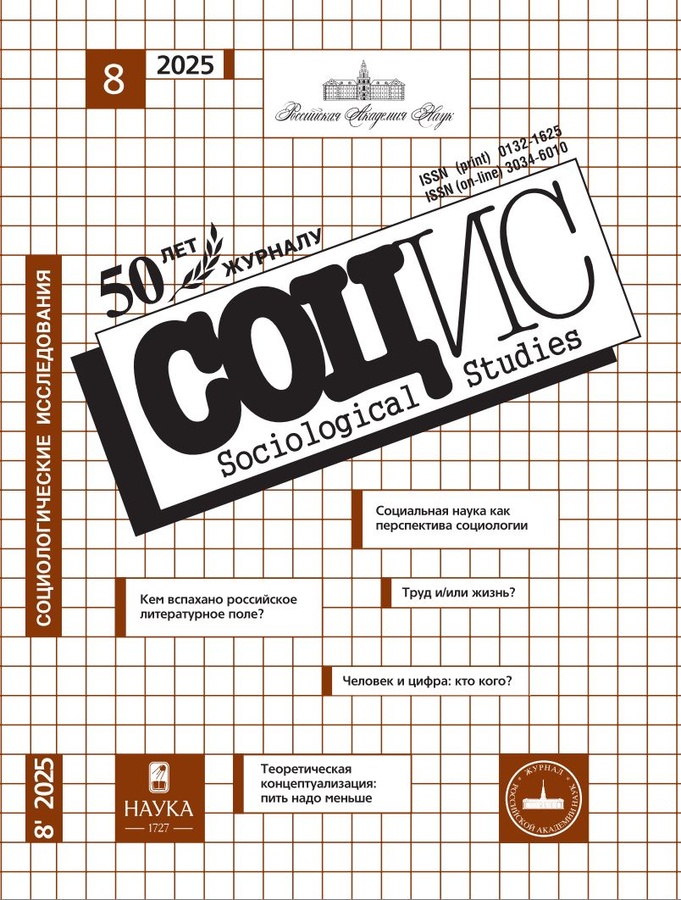Social structure in the eyes of Russians: Issues of legitimacy
- Autores: KRYSHTANOVSKAYA O.V.1, LAVROV I.A.1
-
Afiliações:
- Scientific Center of Digital Sociology “Yadov-center”, Russian State University for the Humanities
- Edição: Nº 8 (2025)
- Páginas: 80-93
- Seção: SOCIAL STRUCTURE. SOCIAL POLICY
- URL: https://freezetech.ru/0132-1625/article/view/693342
- DOI: https://doi.org/10.31857/S0132162525080074
- ID: 693342
Citar
Texto integral
Resumo
This article presents the results of a sociological study devoted to analyzing the perception of the social structure of modern Russian society through the eyes of three generations of Russians. A qualitative sociological study was conducted, including the results of 21 focus groups with the participation of 205 informants from 7 major Russian cities. The main ideas about the criteria of stratification of our society and the principles of self-positioning in it were revealed. A comparative analysis was carried out between three generational groups that underwent socialization in different socio-historical conditions: during the USSR, between late socialism and early capitalism and in modern Russia. According to the results of the analysis, the main trends include: the dominance of economic indicators of stratification in the public consciousness, the delegitimization of higher strata, the disproportionality of the middle class and the transparency of its boundaries, and the marginalization of lower groups. At the same time, serious problems of legitimacy have been revealed: higher strata are associated with dishonest origin of income, low moral qualities and unfair starting opportunities inaccessible to ordinary people. Such perceptions have a demotivating effect on vertical social mobility. The lower strata is presented to the focus group participants as deviation. In one case it is manifested in asocial lifestyle, in another case in unfair assessment of the labor of honest workers by the state. The middle class in this model becomes an island of tranquility, with which overwhelming number of informants identify themselves. Its volume is overestimated and its boundaries are blurred. In general, Russian society is characterized by atomization of public consciousness and lack of consensus in assessing the fairness of the social order.
Palavras-chave
Sobre autores
O. KRYSHTANOVSKAYA
Scientific Center of Digital Sociology “Yadov-center”, Russian State University for the Humanities
Email: olgakrysht@yandex.ru
Moscow, Russia
I. LAVROV
Scientific Center of Digital Sociology “Yadov-center”, Russian State University for the Humanities
Email: lavrov.sociology@gmail.com
Moscow, Russia
Bibliografia
- Белопашенцева П. В. Что говорит о российской бедности депривационный подход? // Мониторинг общественного мнения: экономические и социальные перемены. 2022. № 4(170). С. 110–129.
- Беляева Л. А. Социальные слои в России: опыт кластерного анализа // Социологические исследования. 2005. № 12(260). С. 57–64.
- Воронина Н. Д., Михайлова Н. С. и др. Развитие комплексных подходов к измерению благополучия и качества жизни и учет показателей человеческого потенциала // Образовательная политика. 2023. № 3(95). С. 61–75.
- Голенкова З. Т., Игитханян Е. Д. Самоидентификация личности в социально-структурных процессах // Вестник РУДН. Социология. 2002. № 1. С. 20–26.
- Заславская Т. И. Структура современного российского общества // Мониторинг общественного мнения: экономические и социальные перемены. 1995. № 6. С. 7–13.
- Заславская Т. И. Социальная структура современного российского общества // Общественные науки и современность. 1997. № 2. С. 5–23.
- Ключевский В. О. История сословий в России. М.: Юрайт, 2025.
- Кордонский С. Г. Рынки власти. Административные рынки СССР и России. М.: ОГИ, 2006.
- Кордонский С. Г. Сословная структура постсоветской России (часть I) // Мир России. Социология. Этнология. 2008. № 3. С. 37–66.
- Общество неравных возможностей: социальная структура современной России. М.: Весь Мир, 2022.
- Пишняк А. И., Халина Н. В., Назарбаева Е. А. Потребительские стандарты в восприятии населения России: основные характеристики и границы // Экономическая социология. 2025. Т. 26. № 2. С. 53–81.
- Радаев В. В., Шкаратан О. И. Социальная стратификация. М.: Аспект Пресс, 1996.
- Семенов Ю. И. Политарный («азиатский») способ производства: сущность и место в истории человечества и России. М.: Волшебный ключ, 2008.
- Сталин И. В. Вопросы ленинизма. М.: Госполитиздат, 1952.
- Тихонова Н. Е. Социальная структура российского общества: итоги восьми лет реформ // Общественные науки и современность. 2000. № 3. С. 5–15.
- Тихонова Н. Е. Модель субъективной стратификации российского общества и ее динамика // Вестник общественного мнения. Данные. Анализ. Дискуссии. 2018. № 1–2(126). С. 17–29.
- Фицпатрик Ш. «Приписывание к классу» как система социальной идентификации // Россия и современный мир. 2003. № 2. С. 133–151.
- Шкаратан О. И., Сергеев Н. В. Реальные группы в социальной структуре современной России // Куда идет Россия? Власть, общество, личность. М.: МВШСЭН, 2000. С. 253–265.
- Шкаратан О. И., Ястребов Г. А. Российское неоэтакратическое общество и его стратификация // Социологические исследования. 2008. № 11(295). С. 40–50.
Arquivos suplementares










